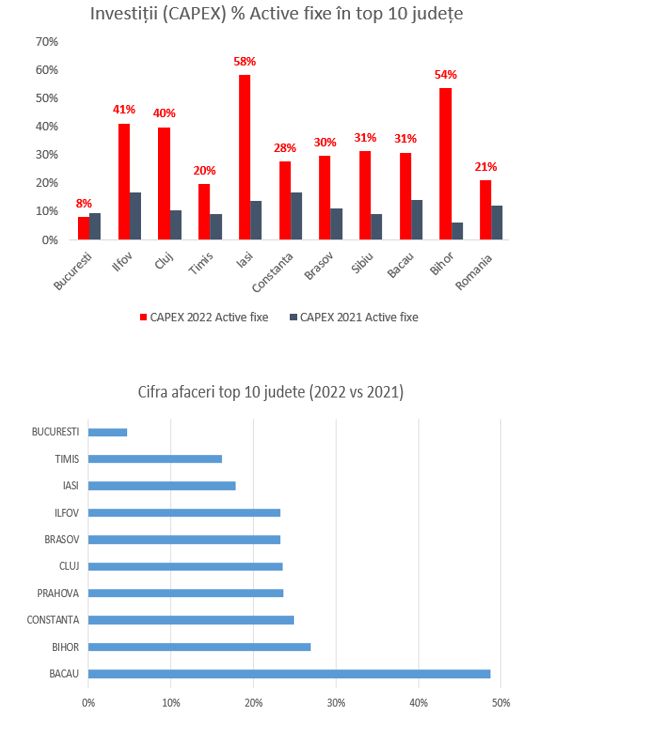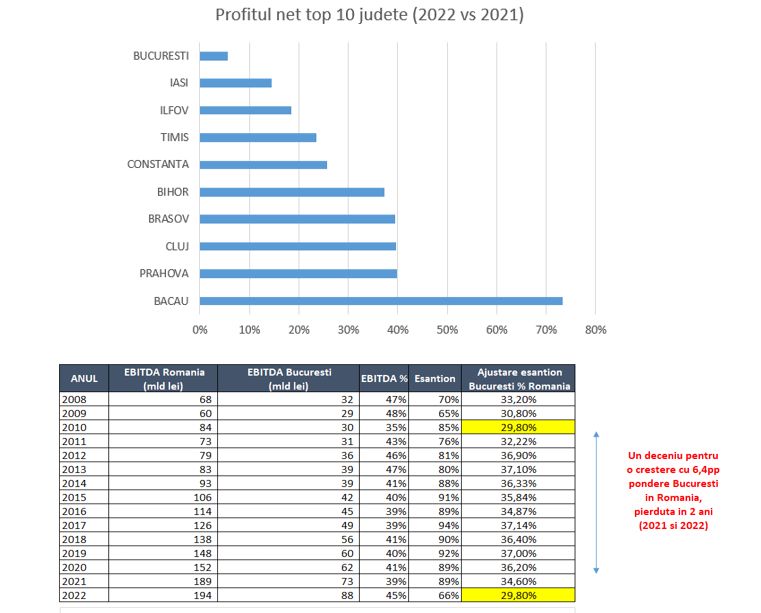The Association of Real Estate Investors in Romania (AREI) expresses its concern about the evolution of the economic situation of the real estate industry, which affects both the legitimate interests of the State and society in general. According to the data provided by the impact study assessing the activity of companies in the construction and real estate transactions sector, these imbalances have deepened in the context of the tax revenues losses generated by the uncertainty of the urban development strategy, as well as the existing administrative gridlock in Bucharest.
Looking at the official figures representative for the sector, as results from the dynamics of the companies active in construction and real estate transactions and based on the financial statements submitted to ANAF (National Agency for Fiscal Administration) for the period 2010-2022, we observe an atypical situation in the last three fiscal years, with a steep decrease in budget revenues, and a return last year to the negative record of 2010.
Thus, the uncertainty and lack of predictability generated by the institutional gridlock in Bucharest has led to a significant reduction in Bucharest's contribution to the GDP formation, as detailed in the charts below, following the exit of many international companies and the massive drop in the operations of existing ones.
Based on the publicly available information analyzed by AREI, that is equally presented analytically in the charts below, the damage caused both, upon the business operators and the budget, may be noted on several dimensions:
1. The share of Bucharest in the national GDP formation decreased in 2022 to 29.8%, the same percentage as in 2010, compared to 37% registered in 2019.
2. The revenues of construction and real estate transactions companies active in Bucharest have diminished to another historic low of only 5% during 2022, a quarter compared to the dynamics of the 10th largest counties in the same sectors, for which the average is 18%. The drop in revenues obviously impacts the entire industry across the board, affecting jobs, reducing budget incomes, and increasing social spendings.
3. The net profit of the same companies follows a negative trend, with the advance in Bucharest being only at 6%, compared to the average of the country's large counties, where the average increase is 22%. This shrinkage of profits is directly and proportionally reflected in the taxes due and paid to the local and central budgets.
4. The advance of investments incurred during 2022 in Bucharest by companies active in the analyzed sectors represented only 8% of the asset base, well below the average of 21% registered by companies in the 10th largest counties in the analyzed sectors.
Equally, the main conclusions of the analysis also highlight the following aspects:
- The Construction and Real Estate industries had a major contribution to the economic recovery at the national level after the impact of Covid-19 and Russia's war in Ukraine (+103,207 additional jobs, +87 bn RON revenues, +70 bn RON fixed assets balances, +62 bn RON equity);
- The contribution of Construction and Real Estate Transactions to GDP formation is significant (14-16% in the last 10 years and 18.5% in 2022);
- The main vulnerability is the reduced size in the context of a very high level of debt (almost 70%) and the continuously decreasing number of construction permits issued (8 out of 10 companies are exposed to the risk of insolvency);
- Discouraging of the long-term investments, reducing their size in relation to the asset base to a historical minimum (due to the uncertainty generated by the unstable urban climate and the administrative gridlock in Bucharest).
Referring to the current dynamics as perceived at the level of the real estate and construction sector, Dennis Selinas, President of the AREI Board of Directors, said: “New challenges have emerged in terms of authorizing a contextual framework, especially in Bucharest, which is increasingly unclear, lacking stability and predictability. Against this background, and especially considering the current fiscal-budgetary context, we believe that a sensible approach would require relevant public policy updates to reverse this negative trend.”



About AREI
The Association of Real Estate Investors in Romania (AREI) is the only Romanian association in real estate that brings together the most significant real estate investors, covering the entire spectrum of the industry: residential buildings, office buildings, retail spaces and logistics.
AREI’s mission is to represent, promote and protect the interests of real estate investors in Romania, with a special focus on enhancing cooperation between relevant authorities and investors.
AREI has succeeded to become a relevant voice of the Romanian business environment, a discussion and working partner with substantial contribution in the public consultation process. AREI aims to function as a dynamic body, constantly growing and reinventing itself to the requirements of the market and its members. AREI supports relevant partnerships between members and partners of the association, understanding the importance of creating a high working standard to be respected by all those committed to being part of the organization.
For more information, please access https://arei.ro/.


































